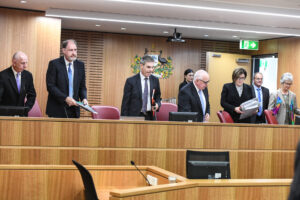Most economists believe inflation has peaked and yet the Reserve Bank is still expected to raise rates next month despite real wages falling by more than 4% last year.
The latest inflation figures showed that in 2022 prices rose faster on average than they have for 32 years. But while this speed might suggest inflation remains out of control, as policy director Greg Jericho notes in his Guardian Australia column, the data suggests that inflation likely has peaked.
Jericho notes that inflation in the December quarter was driven by abnormal jumps in the prices of holidays. Rather than being a sign of prosperity and an overabunance of demand in the economy, more this is a sign of a return to some sort of normality after the lockdown in previous years due to the pandemic.
Similarly a jump in the cost of restaurant meals and takeaway food reflects the ongoing strength in that sector as it fully recovers from the pandemic rather than a sign that eocnmic demand is surging.
The belief that inflation has peaked is also driven by the fact that the prices of goods – especially those driven by international prices – have begun to stabilise. While they continue to grow at paces well above 3%, no longer is the growth rising.
That inflation may be peaking however does not mean there is no pain for householders. Grocery prices mostly rose faster than overall inflation with milk and bread rising 18% and 13% respectively. The increases in rental prices are also now showing up in the data. Rents in all capital cities are rising sharply, and in Adelaide and Brisbane they grew faster in 2022 than they have since 2009.
Amid all this pain, and with economists believing the peak has been reached, the Reserve Bank is still expected to raise rates again next month. This greatly risks slowing the economy more than it needs to and will certainly increase the cost of living for many households.
This latter aspect is most important given the latest inflation figures suggest that real wages have plummeted by more than 4% in 2022. If we assume wage growth in 2022 of 3.25% (slightly above expectations), real wages will now be back at the level they were in June 2009.
This period of rising inflaiton has been terrible for workers.
You might also like
The continuing irrelevance of minimum wages to future inflation
Minimum and award wages should grow by 5 to 9 per cent this year
Want to lift workers’ productivity? Let’s start with their bosses
Business representatives sit down today with government and others to talk about productivity. Who, according to those business representatives, will need to change the way they do things?
Go Home On Time Day 2025. As full timers disconnect, part timers are doing more unpaid overtime
New research by the Centre for Future Work at The Australia Institute has revealed a disturbing new twist when it comes to unpaid overtime in Australia.


